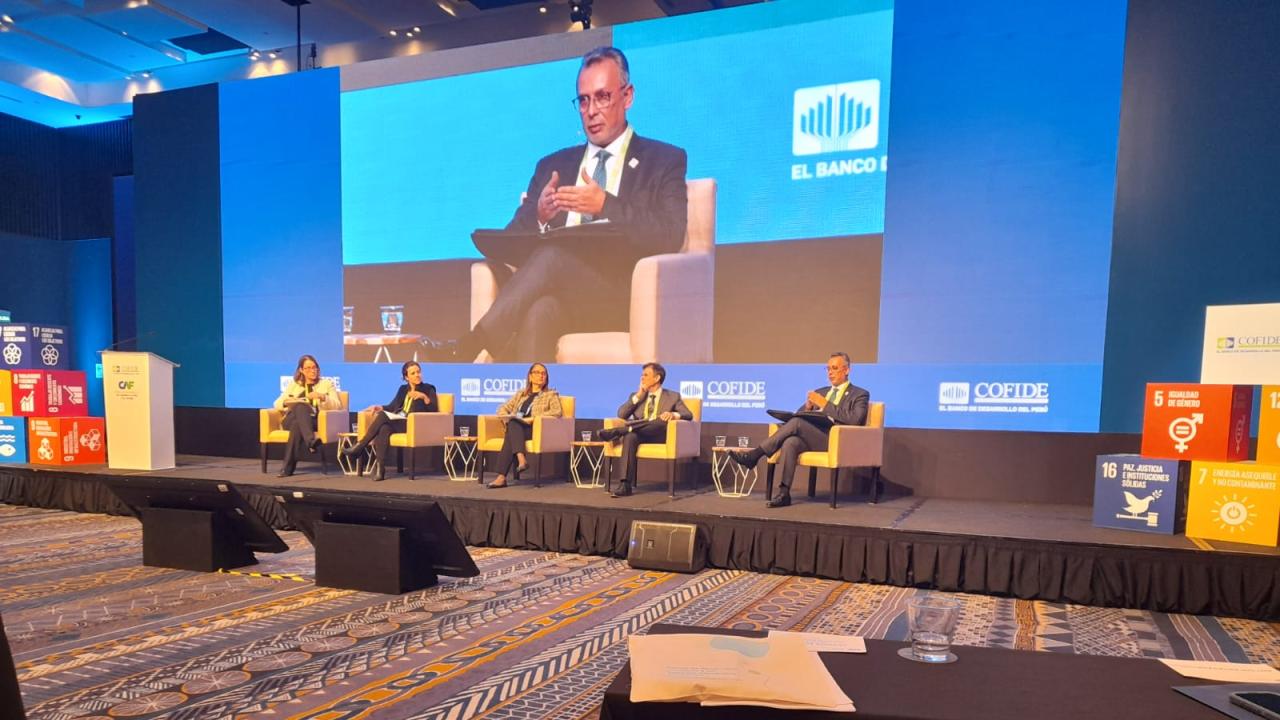
Founded in 1971, the Peruvian second-tier bank still has a limited scope around infrastructure projects, digitalization and social programs. Will the alliance with CAF put it at the forefront?
Global economic crisis cycles such as the COVID-19 pandemic and the war in Ukraine have weakened the credit capacity of international organizations such as the International Monetary Fund (IMF) and the World Bank. Historically, these institutions have been protagonists in lending funds to Latin American countries with a view to boosting economic growth.
In this context, development banks have become relevant as alternatives, since in addition to granting credit, they provide financial and non-financial services to companies. At the same time, many design financial instruments that promote business and technological development in excluded sectors.
Regional institutions such as the Inter-American Development Bank (IDB) and the Development Bank of Latin America (CAF) stand out, and at the national level, initiatives such as the Production Promotion Corporation of Chile (Corfo) and the Financial Development Corporation of Peru (Cofide). The latter was the focus of attention last week at the event “Modern development banking and its impact on the sustainable development of Peru.”
The main axis was CAF's approval of a capital investment in Cofide for up to US$ 10 million, with a view to converting the Peruvian entity into a modern development bank that meets the needs and demands of the Andean country.
In this regard, Sergio Díaz-Granados, executive president of CAF, declared that the international bank is committed to the sustainable development of Peru under the vision of the 2030 Agenda, outlined by the United Nations (UN) General Assembly. This purpose includes sustainable objectives such as the end of poverty, quality education, zero hunger, clean water and sanitation, among others.
“We are a strategic ally that shares the objective of promoting the promotion and financing of investment in Peru, so we are pleased to contribute to strengthen Cofide and we will continue joining efforts to establish support mechanisms, technical and financial cooperation, that provide more opportunities to improve the productivity and competitiveness of the country,” declared Díaz-Granados during his presentation.
Likewise, the relationship between CAF and Cofide spans three decades, a period characterized by preferred shareholding, which will become common shareholding. On the other hand, the Peruvian development bank will not only have greater funds, but also improvements in its corporate governance and internal management.
While in the long term, it is expected to promote improvements such as a higher credit rating for Cofide, gradually expand the portfolio to contribute to closing gaps for the development of Peru and mobilize a greater amount of private resources.
Subsequently, this need was reinforced with the participation of Antoni Estevadeordal , an expert in trade policy, economic integration and regional cooperation in Latin America and the Caribbean. The Spanish academic highlighted the importance of Peru having an updated development bank that provides strategies and policies to reduce the country's social and economic gaps.
For his part, Jorge Velarde, president of the Board of Directors of Cofide, thanked the capital contribution and technical assistance provided by CAF. He then described the event as an opportunity to disseminate the conclusions of the ongoing work to modernize Cofide. It is a slogan that will materialize in reforms derived from the delegation of economic powers to the Peruvian government, recently approved by Congress.
“We seek to increase Cofide's contribution to the development of our markets, to MSMEs and the productive sectors through the financial system, as well as to the efficient financing of the large infrastructure projects that Peru requires,” declared Velarde during his speech.
On the other hand, during the press conference, the director of Cofide acknowledged that its scope is limited compared to the possibilities offered by similar entities in neighboring countries. For example, Colombia's National Development Finance Company finances the construction of infrastructure, while Chile's Corfo promotes digital transformation.
Although he did recognize that the history of Cofide, founded in 1971, has played a supporting role for the financial system given its links with small and medium-sized actors in the Peruvian economy. “Our main product is clearly to grant lines of credit to banks, municipal and rural savings banks. Many times these services served micro and small businesses or cases of inclusion in gender and diversity issues, but certainly the impact we can have is still timid,” he added.
Regarding Cofide's foray into the energy transition in Peru, Velarde was optimistic about the progress, although he acknowledged that reaping the fruits will take time.
“Cofide has approved to join the financing of the largest solar park project the country will have. It is located in Arequipa and we work in collaboration with another bank. We are also seeing other operations with a sustainability scope. We do not rule out being a promoter of green hydrogen and other energy sources that can change the face of energy in the country, and even that we can be exporters. But it is a gradual process that will take time,” declared Velarde for AméricaEconomía .
In parallel, Cofide develops blue bonds, the proceeds of which help finance sustainable wastewater management in vulnerable populations. This is a project carried out in conjunction with the municipal funds to guarantee its expansion.
“These people may not even have a connection to water or sewage, but so that they can have a decent bathroom and avoid buying water every day, we decided to finance services so that they have their own water and food system, in some cases connected, and in others, isolated,” said Velarde.









